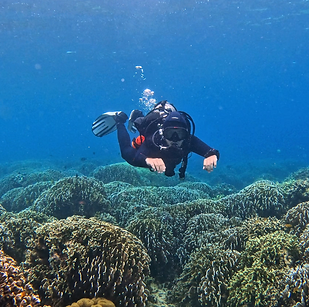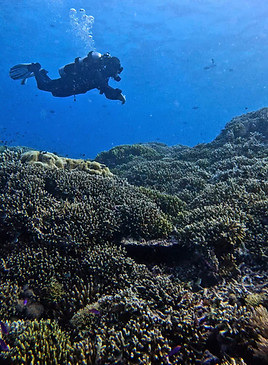
Documenting Coral Health is What We Do Best
We're on a 10 month mission to report the current coral condition of over 300 reefs in the Coral Triangle; all to help coral enthusiasts see, share, and save them!

Let's Be Honest—
This Isn't Your Average Coral Org
Raf's Reef Brief isn't a professional team of scientists saving coral reefs, nor is it a money hungry travel agency— it's just one overly ambitious coral nerd:
Me! My name is Rafael, and if you've come here from our Instagram or Reef Briefs, then you already know I'm a passionate coral enthusiast on a 10 month expedition with my partner, Sophia.
But before I share all the juicy (and boring) details of our lives, let me tell you why I started Raf's Reef Briefs:
Our Planet's Coral Reefs Are Changing;
And Nobody Can Tell The Difference
Everyone knows that coral reefs are declining worldwide— especially the branching hard corals that are most crucial for ocean life.
Part of that change is natural: reefs are dynamic ecosystems that have always waxed and waned in cycles that last decades.
As a result, fast growing hard corals like branching Acropora & Porites have uniquely evolved to be the first to regrow, at the cost of being the easiest to destroy.
But human induced coral bleaching events are stopping these corals from ever recovering— tragically turning the most widespread and important coral species into a rarity.
There's just one problem: Almost no one knows enough about coral to consistently differentiate between reefs that are dead versus alive, critical versus extraneous.
This lack of knowledge isn't isolated; it's present among local communities, activist organizations, and tourism industries (especially scuba divers).
And here is where the nightmare begins— when the communities surrounding reefs can't see the difference between surviving Acropora colonies versus rubble fields smothered by soft corals, devastated reefs are mistaken as healthy.
False information spreads, and fiction becomes fact. Discussing, researching, and visiting reefs that are still high in healthy hard corals is now a significant challenge outside academia.
And if the public can't recognize the importance and rarity of the hard corals that keep our oceans alive, how can we ever hope to rally the support to conserve them?
Finding Healthy Corals Can Feel... Impossible
Does This Sound Familiar?
Your passion for corals, whether from your hobbies as an enthusiast or career as a scientist, has led you to search for destinations to snorkel and dive so you can see high cover, mature hard coral reefs before it's too late.
Researching online, no reports talk about coral cover or genera in enough detail to give you a clear picture of reef health. Dive reports and pictures are all focused on large marine life, and the healthy reefs you do hear about are either out of date or focused on non-reef-building soft corals. Maybe you'll be able to ask about the corals in person?
But once on the dive boat, your questions about coral are met with wide eyes and confusion. None of the guides have any idea what corals you're talking about, and everyone else wants to find turtles and manta rays, so you're told there are 'beautiful' corals on every dive.
Once in the water, you realize the reefs are utterly devastated— Acropora colonies are nonexistent, live coral cover is low, and those present are fast growing soft corals growing on the skeletons and rubble of long gone hard corals.
Back on the boat, the divers & locals alike mistakenly rejoice how healthy the reefs are, and even share it online. How can coral restoration ever have a chance if the communities closest to it aren't even aware of what decline looks like?
If this has happened to you before, don't worry! Our Reef Briefs and weekly insights will ensure you never struggle to find pristine coral cover ever again.
But more importantly...
We're going to revolutionize the way the world understands and discusses corals.
No more blank stares, false judgements, or lack of awareness— its time we help the world see, share, and save our coral reefs.
Our 3 Step Plan to Change The Coversation on Coral Reefs
Leveraging our expedition documentation & experience as coral enthusiasts to increase awareness on shifting coral baselines— and get resources where they matter most.
A 10 Month Expedition to
Survey the Coral Triangle ...

Step 1 above details the construction of a Reef Brief database on this very website— which is exactly why we packed our lives into two giant bags and leapt into the unknown.
The goal? Personally dive & snorkel as many Coral Triangle locations as possible to assess the coral resilience, threats, preservation of each reef. Video, photo, and map collection are top priority to reinforce our amateur coral health assessments.
Each site visited is the result of 2 years of researching university publications, diver trip reports, and any picture we could find!
The expedition began May 2025 and is expected to continue through early 2026 covering over 300 individual coral reefs.
... and Document the Best Reefs
For Coral Enthusiasts Like YOU

The Reef Briefs, our coral condition reports detailing the current health of corals at each site of our expedition, are the bread & butter of Raf's Reef Briefs; after all, they're in the name!
Each brief is hand crafted to inform coral enthusiasts, scientist or citizen, where pristine reefs still exist (and where they don't). Expect maps, logistics, coral ID, and 100's of pictures!
If you're tired of visiting dead reefs, these briefs are for you— you won't read trip reports this focused on coral anywhere else.
Content That Gives Corals
The Spotlight They Deserve!
Step 2 of our goals above focuses on reshaping how locals, tourists, and activists identify & think about hard coral cover.
Utilizing our accumulated media, marketing experience, & expedition story we've been able to produce a content strategy that blends education with impact.
The results? 3M+ views and thousands of followers in just two months within a low ceiling niche. And we're just getting started!
While we have thus far focused on short form video content optimized for Instagram, we plan to expand into other platforms and video lengths when resources allow.
Meet The Team
Meet us!
About Raf
Over my childhood I obsessed over wide angle shots of never-ending branching Acropora and foliose Montipora; for years they were my dream reefs and I channeled that passion into scuba diving & propagating hard corals for a local aquarium store during high-school.
Unfortunately, I failed to find & document most of those 'dream reefs' before they were completely destroyed. That heartbreak follows me always.
I hope that our Coral Triangle expedition and the briefs on this website will prevent other coral enthusiasts from suffering the same fate.
My proudest moments have been seeing the wide eyes on local guides and other coral enthusiast's faces when we take them to a healthy Acropora dominant reef they never new existed. Priceless!
Hey Everyone! While I'm a Scleractinia coral nerd first and foremost, I'm also PADI divemaster and mechanical engineer from Florida, USA.




About Sophia
Although I only started diving at university after being convinced by Raf, it's quickly become one of my dearest hobbies.
Identifying coral genera and witnessing coral ecology in action are now some of my favorite parts about diving; especially the purpley-blue branching Acropora's found when diving shallow.
I'm very excited to take on the challenge of tech & rebreather diving once we complete our Coral Triangle expedition.
Hi! While I'm not an obsessed coral nerd like Raf, I'm also a passionate scuba diver from the USA.
One Last Disclaimer—
Our Opinions On Coral Are... Subjective
As I hope you've gathered by now, Raf's Reef Brief is more personal passion than it is professional. Neither Sophia or I have any certifications or degrees in coral related fields (for now).
As a result all opinions are our own; based solely off self determined criteria and amateur observations. Biases, emotions, and lack of experience may come into play... you've been warned!
We do our best to be fair to each location & community, without sacrificing our honesty (you'll find no paid opinions or sponsorships here). For more information on how we grade the reefs we document, please check out the pictures and standardized Reef Rating system we include on every single Reef Brief.
If you're still curious, here's an example of what I (amateurishly) consider an outstanding reef: >95% live coral coverage, huge mature colonies, and precense of key growthforms and genera like these branching Isopora, Porites, and of course Acropora.

